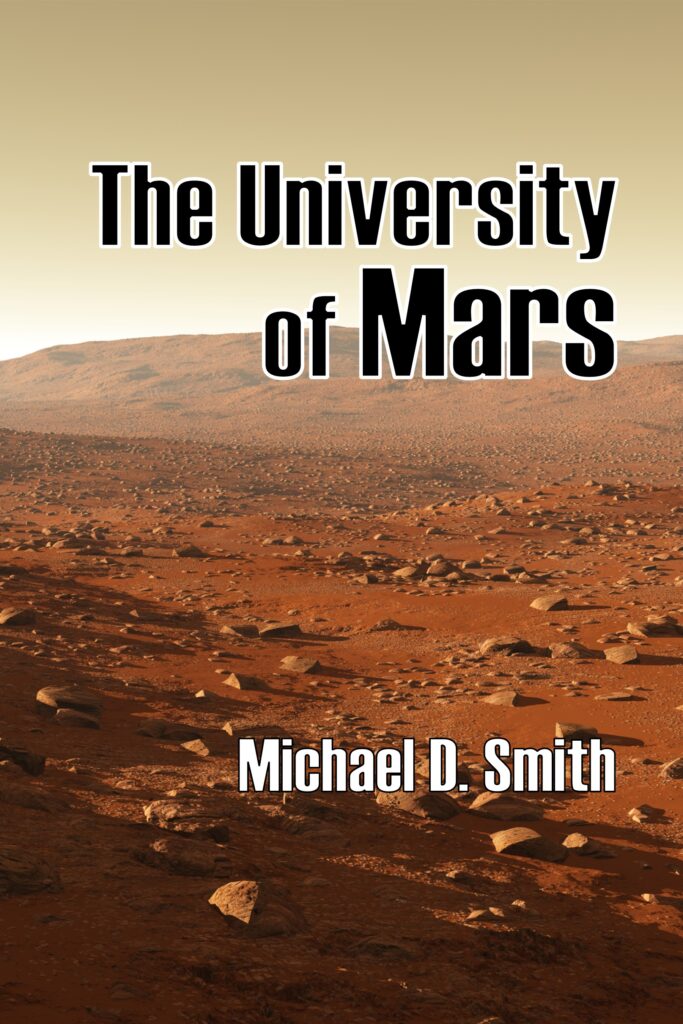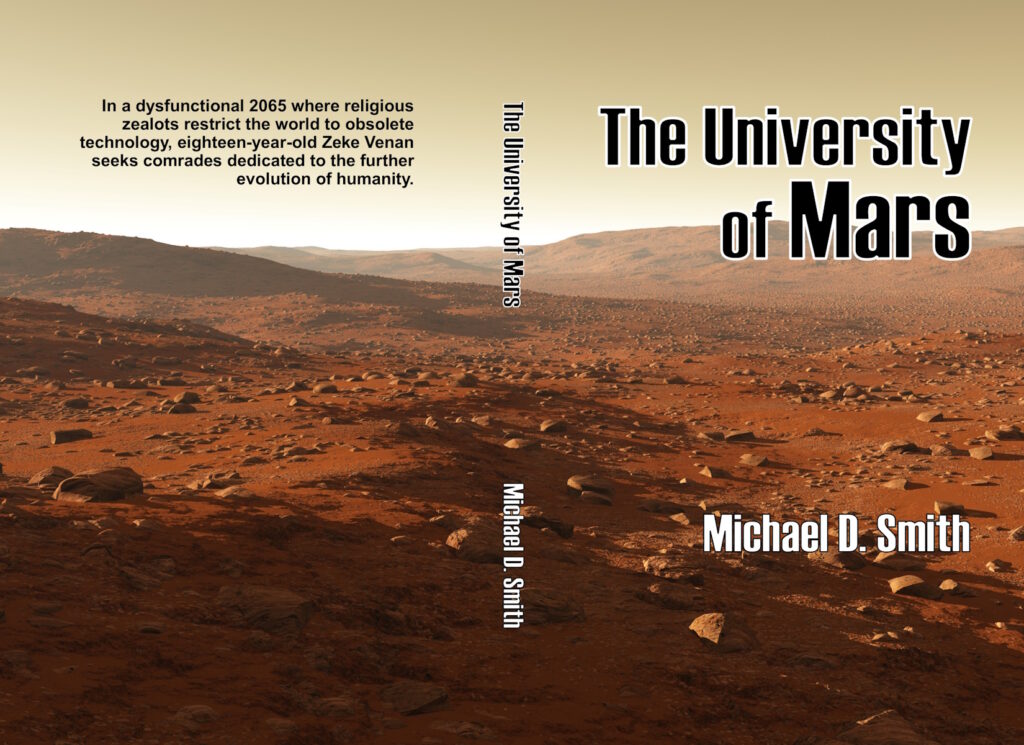A Brief History of The University of Mars
As I mull over a forthcoming post to celebrate the long-overdue publication of The University of Mars, I’ve reflected a bit on its extended history.
 I. Draft 1, 1980-1981
I. Draft 1, 1980-1981
The novel began with a longing to describe an archetypal University of Mind. Mixing in was a rereading of Shirer’s The Rise and Fall of the Third Reich and the mythic legacy of WWII. Then came a morbid fascination with UFO abduction literature. Soon I was churning out a science fiction “novel of ideas,” but after a while it got dull. Was incorporating a farcical short story about Nazi Germany’s Me-163 rocket fighter a good idea? Was all the belabored plot and exposition about the West Texas Revolution of 1999 just a tired joke? Where was the sensuous flood of characters, situations, or even sensuous ideas? I tried adding an autobiographical Part II about my second-semester sophomore year at Rice, but that in turn meandered aimlessly. I couldn’t bring myself to feel any enthusiasm about finishing this book and finally had to declare the experiment over at ten chapters and 250 pages. The decision was made easier by the fact that I had sighted a better novel.
II. Zarreich, Draft 2, and Manuscript, 1981-1986
Amid the ongoing confusion about what was wrong with The University of Mars, I kept returning to the idea of a psychological novel. I knew my writing was not adult; my early novels had aimed at serious issues but usually veered quickly into irony and cynicism.
Now Zarreich broke through my previous taboos. In this novel an adolescent comes to live in a small town with his grandmother, only to discover all his memories wiped out. He panics and commits a murder, then finds himself a member of a secret commune remembered only in dreams. Zarreich wound up being an extremely rich but disordered effort, yet its 1981-82 draft smashed my inner censor. I found a new voice in which the main character of The University of Mars could ponder his romantic feelings for the female lead, and I had my first practice writing from the female’s point of view. And I saw a way to a breakthrough ending.
Proud of my efforts, I typed a 320-page manuscript and sent The University of Mars to twenty-three publishers from 1984-1986. Yet I finally withdrew it from publication efforts not because I’d lost faith in the novel as a whole, but because I saw how badly it needed a tune-up. The eight chapters were overlong, with crazy detours, long unnecessary exposition, confusing flashbacks, and dialog that would would disappear for hours. I didn’t have one of the new PCs yet, but figured that if I did I could rewrite this book magnificently in three or four weeks. But as other novels beckoned I lost sight of The University of Mars.
III. 2009
By 2009 I’d scanned and edited most of my earlier typewritten novels. The University of Mars had been OCR’d but was in such a rough state that it really wasn’t much of a backup. I decided I might occasionally proof one or two chapters against the typed MS. just to have a final archival copy. But now I saw that there was indeed a lovely novel somewhere in there; in 1984 I just hadn’t known how to bring it out. So I consolidated characters, streamlined the plot, removed exposition, and chopped its eight dense chapters into thirty-four lively ones.
But the entire effort was fatally marred by a tactical writing mistake. For a few years I’d been adding more and more italicized thinking to my novels, feeling that italics added “fast and real emotion.” Otherwise excellent successive revisions of Akard Drearstone, Sortmind, and The Soul Institute, along with the first four Jack Commer SF novels, were polluted with characters thinking in highly irritating present-tense italics, sometimes for pages at a time–that is, before I sensibly translated all those novels back into useful narrative.
The 2009 University of Mars, despite its excellent new plot, was spoiled by overwhelming amounts of this putrid italicization; I’d never used so much before and still can’t conceive why I did that. Yet, apparently hoping that fast and real emotion would land a contract in the brave new world of eBooks, I sent the 2009 version to several publishers. But after a few rejections I began to realize what was wrong with the novel and declared it unpublishable.
See the merciless 2015 post, Homage Part 1: Farewell to The University of Mars, for a devastating analysis of everything wrong with the book, plus further ruminations.
IV. 2024
The memory of that debacle was so ingrained that for years I continued to scorn The University of Mars as a failed experiment best left in the desk drawer. Yet earlier this year I found myself intrigued by the thought of just cleaning it up as an exercise, not for publication. The goal would be to simplify an existing book and bring it up to a respectable standard.
The major thrust would be rewriting italic thoughts into narrative, but I figured I might as well correct typos and cut down as much verbiage and exposition as possible as well as change boring or cute character names.
Then I was truly surprised to see, as I translated italics back into a real narrative, a compelling story underneath all that pollution. I saw that the 2009 version had in fact pulled together a great plot and characters. Tansley’s Chapter Six and Zeke’s Chapter Seven were revelations. A cover idea hit me and my enthusiasm for the project ballooned. At first I thought I might publish this in a low-key manner, maybe only as a small mass market on lulu.com, but as more and more fictional quality emerged from successive edits I began to see a true novel in front of me. Somehow I’ve reached back into an impulse from decades ago and expressed the real thing I’ve wanted all along.
copyright 2024 by Michael D. Smith


Pingback:The University of Mars – Publication – Sortmind Blog – Michael D. Smith